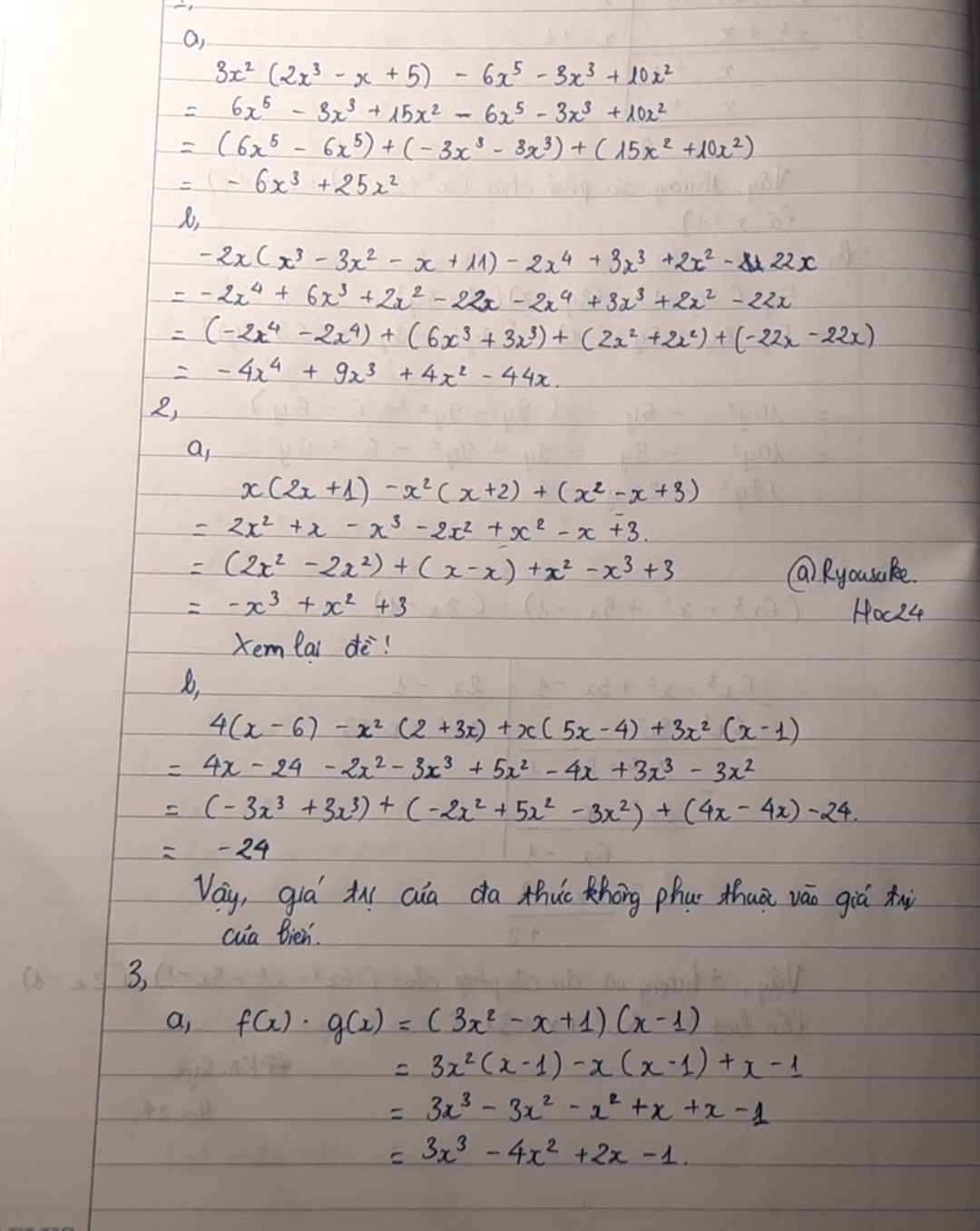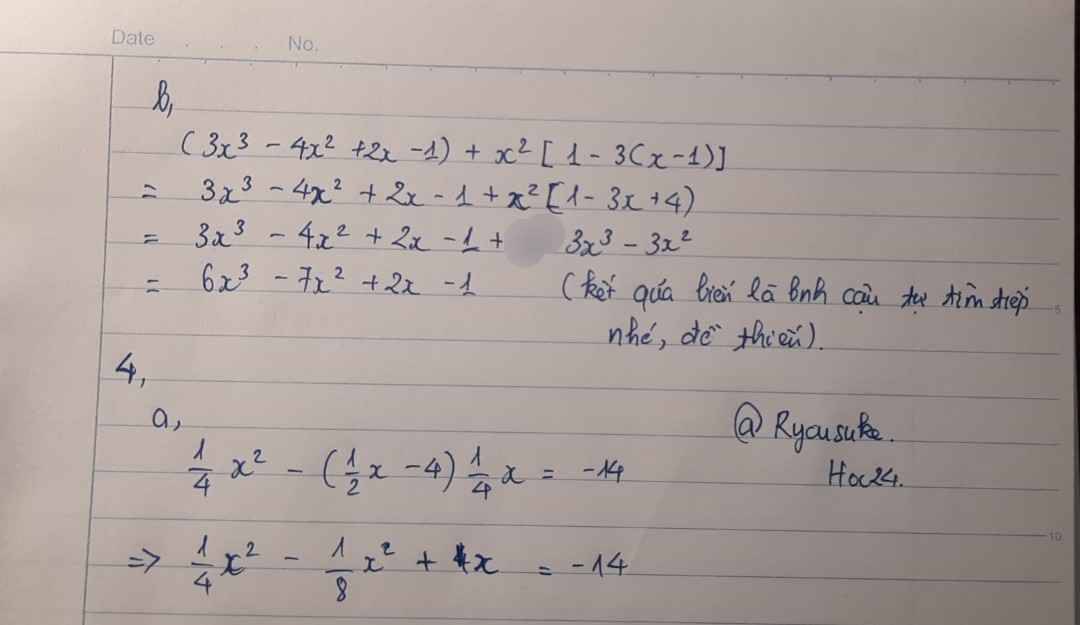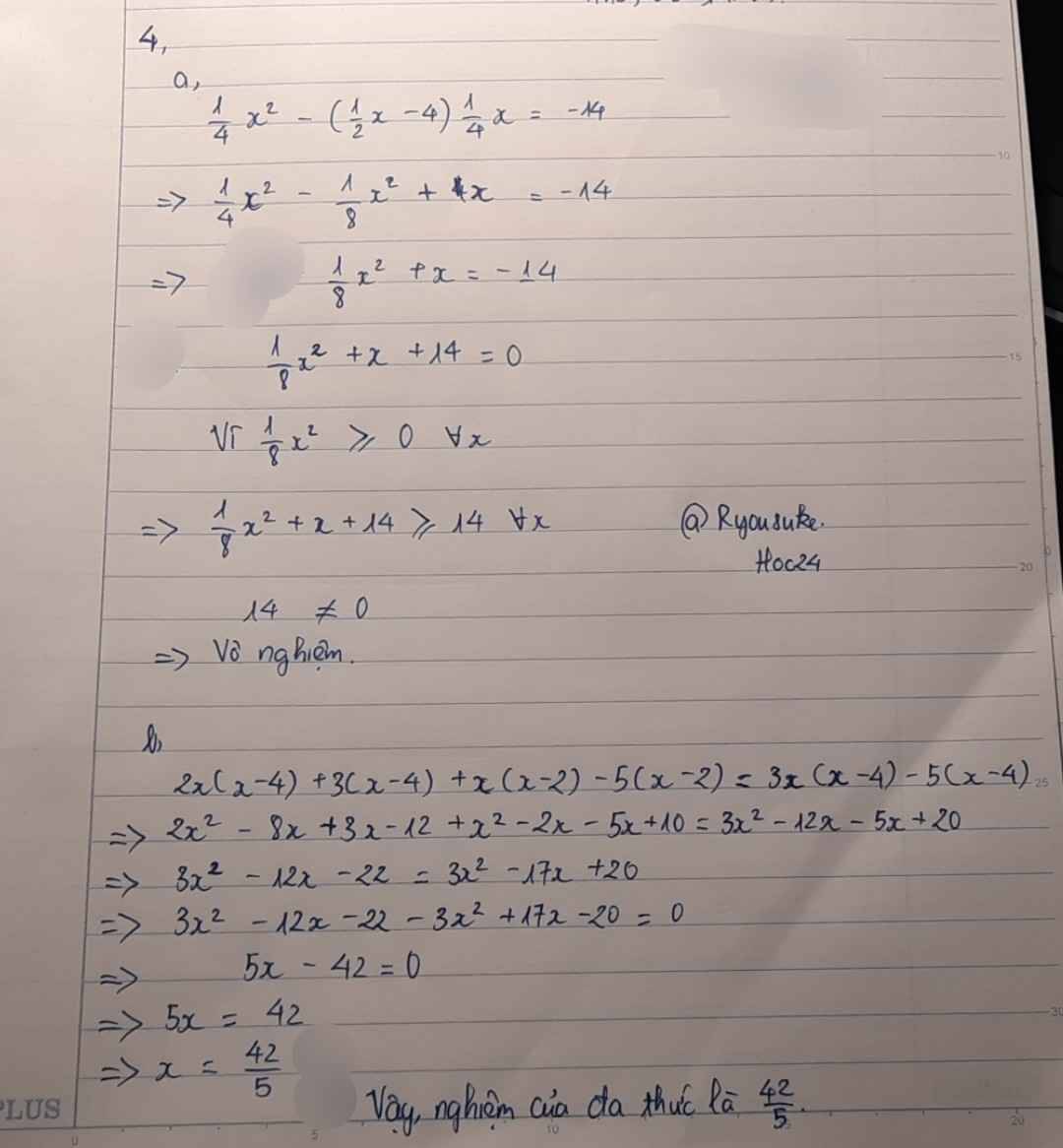Tìm x
A) (X+2)2 +3x2 -5=(2x-3)2 +5x-6
B) 4(x+1)2 +(2x-1)2 -8(x-1)(x+1)=11
Tuyển Cộng tác viên Hoc24 nhiệm kì 26 tại đây: https://forms.gle/dK3zGK3LHFrgvTkJ6
Bài 1: Thực hiện phép tính:
a) 2x.(3x + 3) b) 5x.(3x2-2x + 1) c) 3x2(2x +4)
d) 5x2.(3x2 + 4x – 1) e) (x-1).(2x +3) f) (x+2).(3x-5)
Bài 2: Tìm x, biết:
a) 3x(x+1) – 3x2 = 6
b) 3x(2x+1) – (3x +1).(2x-3) = 10
Bài 1:
\(a,=6x^2+6x\\ b,=15x^3-10x^2+5x\\ c,=6x^3+12x^2\\ d,=15x^4+20x^3-5x^2\\ e,=2x^2+3x-2x-3=2x^2+x-3\\ f,=3x^2-5x+6x-10=3x^2+x-10\)
Bài 2:
\(a,\Leftrightarrow3x^2+3x-3x^2=6\\ \Leftrightarrow3x=6\Leftrightarrow x=2\\ b,\Leftrightarrow6x^2+3x-6x^2+9x-2x-3=10\\ \Leftrightarrow10x=13\Leftrightarrow x=\dfrac{13}{10}\)
Giải phương trình
1) 2x ( x – 3 ) + 5 ( x – 3 ) = 0
2) ( x2 – 4 ) – ( x – 2 ) ( 3 – 2x ) = 0
3) ( 2x – 1 )2 – ( 2x + 5 )2 = 11
4) ( 2x + 1 )2 ( 3x – 5 ) = 4x2 – 1
5) 3x2 – 5x – 8 = 0
6) ( 2x + 1 )2 ( 3x – 5 ) = 4x2 – 1
7) 3x2 – 5x – 8 = 0
8) \(\left|x-5\right|=3\)
9) \(\left|2x-5\right|=3-x\)
10) \(\left|2x+1\right|=\left|x-1\right|\)
11) \(\dfrac{5x+2}{6}-\dfrac{8x-1}{3}=\dfrac{4x+2}{5}-5\)
12) \(\dfrac{3x+2}{2}-\dfrac{3x+1}{6}=2x+\dfrac{5}{3}\)
1) Ta có: \(2x\left(x-3\right)+5\left(x-3\right)=0\)
\(\Leftrightarrow\left(x-3\right)\left(2x+5\right)=0\)
\(\Leftrightarrow\left[{}\begin{matrix}x=3\\x=-\dfrac{5}{2}\end{matrix}\right.\)
2) Ta có: \(\left(x^2-4\right)-\left(x-2\right)\left(3-2x\right)=0\)
\(\Leftrightarrow\left(x-2\right)\left(x+2\right)+\left(x-2\right)\left(2x-3\right)=0\)
\(\Leftrightarrow\left(x-2\right)\left(3x-1\right)=0\)
\(\Leftrightarrow\left[{}\begin{matrix}x=2\\x=\dfrac{1}{3}\end{matrix}\right.\)
3) Ta có: \(\left(2x-1\right)^2-\left(2x+5\right)^2=11\)
\(\Leftrightarrow4x^2-4x-1-4x^2-20x-25=11\)
\(\Leftrightarrow-24x=11+1+25=37\)
hay \(x=-\dfrac{37}{24}\)
5) Ta có: \(3x^2-5x-8=0\)
\(\Leftrightarrow3x^2+3x-8x-8=0\)
\(\Leftrightarrow3x\left(x+1\right)-8\left(x+1\right)=0\)
\(\Leftrightarrow\left(x+1\right)\left(3x-8\right)=0\)
\(\Leftrightarrow\left[{}\begin{matrix}x=-1\\x=\dfrac{8}{3}\end{matrix}\right.\)
8) Ta có: \(\left|x-5\right|=3\)
\(\Leftrightarrow\left[{}\begin{matrix}x-5=3\\x-5=-3\end{matrix}\right.\Leftrightarrow\left[{}\begin{matrix}x=8\\x=2\end{matrix}\right.\)
10) Ta có: \(\left|2x+1\right|=\left|x-1\right|\)
\(\Leftrightarrow\left[{}\begin{matrix}2x+1=x-1\\2x+1=1-x\end{matrix}\right.\Leftrightarrow\left[{}\begin{matrix}2x-x=-1-1\\2x+x=1-1\end{matrix}\right.\)
\(\Leftrightarrow\left[{}\begin{matrix}x=-2\\x=0\end{matrix}\right.\)
Tìm x, biết:
a) 2(5x-8)-3(4x-5) = 4(3x-4) + 11;
b) 2 x ( 6 x - 2 x 2 ) + 3 x 2 ( x - 4 ) = 8;
c) 2 ( x 3 - 1 ) - 2 x 2 ( x + 2 x 4 ) + ( 4 x 5 + 4 ) x = 6;
d)(2x)2(4x-2)-(x3 -8x2) = 15.
a) x = 2 7 b) x = 2.
c) x = 2 d) x = 1.
Bài 4: Tìm x, biết:
a) 3(2x – 3) + 2(2 – x) = –3 ; b) x(5 – 2x) + 2x(x – 1) = 13 ;
c) 5x(x – 1) – (x + 2)(5x – 7) = 6 ; d) 3x(2x + 3) – (2x + 5)(3x – 2) = 8 ;
e) 2(5x – 8) – 3(4x – 5) = 4(3x – 4) + 11; f) 2x(6x – 2x 2 ) + 3x 2 (x – 4) = 8.
\(a,3\left(2x-3\right)+2\left(2-x\right)=-3\\ \Leftrightarrow6x-9+4-2x=-3\\ \Leftrightarrow4x=2\\ \Leftrightarrow x=\dfrac{1}{2}\\ b,x\left(5-2x\right)+2x\left(x-1\right)=13\\ \Leftrightarrow5x-2x^2+2x^2-2x=13\\ \Leftrightarrow3x=13\\ \Leftrightarrow x=\dfrac{13}{3}\\ c,5x\left(x-1\right)-\left(x+2\right)\left(5x-7\right)=6\\ \Leftrightarrow5x^2-5x-5x^2-3x+14=6\\ \Leftrightarrow-8x=-8\\ \Leftrightarrow x=1\\ d,3x\left(2x+3\right)-\left(2x+5\right)\left(3x-2\right)=8\\ \Leftrightarrow6x^2+9x-6x^2-11x+10=8\\ \Leftrightarrow-2x=-2\\ \Leftrightarrow x=1\)
\(e,2\left(5x-8\right)-3\left(4x-5\right)=4\left(3x-4\right)+11\\ \Leftrightarrow10x-16-12x+15=12x-16+11\\ \Leftrightarrow-14x=-4\\ \Leftrightarrow x=\dfrac{2}{7}\\ f,2x\left(6x-2x^2\right)+3x^2\left(x-4\right)=8\\ \Leftrightarrow12x^2-4x^3+3x^3-12x^2=8\\ \Leftrightarrow-x^3-8=0\\ \Leftrightarrow-\left(x^3+8\right)=0\\ \Leftrightarrow-\left(x+2\right)\left(x^2-2x+4\right)=0\\ \Leftrightarrow\left[{}\begin{matrix}x=-2\\x\in\varnothing\left(x^2-2x+4=\left(x-1\right)^2+3>0\right)\end{matrix}\right.\)
Bài 4:
a: Ta có: \(3\left(2x-3\right)-2\left(x-2\right)=-3\)
\(\Leftrightarrow6x-9-2x+4=-3\)
\(\Leftrightarrow4x=2\)
hay \(x=\dfrac{1}{2}\)
b: Ta có: \(x\left(5-2x\right)+2x\left(x-1\right)=13\)
\(\Leftrightarrow5x-2x^2+2x^2-2x=13\)
\(\Leftrightarrow3x=13\)
hay \(x=\dfrac{13}{3}\)
c: Ta có: \(5x\left(x-1\right)-\left(x+2\right)\left(5x-7\right)=6\)
\(\Leftrightarrow5x^2-5x-5x^2+7x-10x+14=6\)
\(\Leftrightarrow-8x=-8\)
hay x=1
a/ \(3\left(2x-3\right)+2\left(2-x\right)=-3\)
\(\Leftrightarrow6x-9+4-2x=-3\)
\(\Leftrightarrow4x=2\)
\(\Leftrightarrow x=\dfrac{1}{2}\)
Vậy: \(x=\dfrac{1}{2}\)
===========
b/ \(x\left(5-2x\right)+2x\left(x-1\right)=13\)
\(\Leftrightarrow5x-2x^2+2x^2-2x=13\)
\(\Leftrightarrow3x=13\)
\(\Leftrightarrow x=\dfrac{13}{3}\)
Vậy: \(x=\dfrac{13}{3}\)
==========
c/ \(5x\left(x-1\right)-\left(x+2\right)\left(5x-7\right)=6\)
\(\Leftrightarrow5x^2-5x-5x^2+7x-10x+14=6\)
\(\Leftrightarrow-8x=-8\)
\(\Leftrightarrow x=1\)
Vậy: \(x=1\)
==========
d/ \(3x\left(2x+3\right)-\left(2x+5\right)\left(3x-2\right)=8\)
\(\Leftrightarrow6x^2+9x-6x^2+4x-15x+10=8\)
\(\Leftrightarrow-2x=-2\)
\(\Leftrightarrow x=1\)
Vậy: \(x=1\)
==========
e/ \(2\left(5x-8\right)-3\left(4x-5\right)=4\left(3x-4\right)+11\)
\(\Leftrightarrow10x-16-12x+15=12x-16+11\)
\(\Leftrightarrow-14x=-4\)
\(\Leftrightarrow x=\dfrac{2}{7}\)
Vậy: \(x=\dfrac{2}{7}\)
==========
f/ \(2x\left(6x-2x^2\right)+3x^2\left(x-4\right)=8\)
\(\Leftrightarrow12x^2-4x^3+3x^3-12x^2=8\)
\(\Leftrightarrow-x^3=8\)
\(\Leftrightarrow x=-2\)
Vậy: \(x=-2\)
Bài 1: Rút gọn biểu thức sau:
a. 3x2(2x3- x+5) - 6x5-3x3+10x2
b. -2x(x3-3x2-xx+11)-2x4+3x3+2x2-22x2x
Bài 2: Chứng minh biểu thức sau không phụ thuộc vào x:
a. x(2x+1)-x2(x+2)+(x2-x+3)
b. 4(x-6)-x2(2+3x)+x(5x-4)+3x2(x-1)
Bài 3: Cho đa thức: f(x)=3x2-x+1
g(x)=x-1
a. Tính f(x).g(x)
b. Tìm x để f(x).g(x)+x2[1-3g(x)]=
Bài 4: Tìm x:
a. \(\dfrac{1}{4}\)x2-(\(\dfrac{1}{2}\)x-4)\(\dfrac{1}{2}\)x=-14
b. 2x(x-4)+3(x-4)+x(x-2)-5(x-2)=3x
(x-4)-5(x-4)
Các bạn giúp mik giải bt nha. Cảm ơn mn nhiêu ạ.
`@` `\text {Ans}`
`\downarrow`
Gửi c!



Bài 1:
a) \(3x^2\left(2x^3-x+5\right)-6x^5-3x^3+10x^2\)
\(=6x^5-3x^3+10x^2-6x^5-3x^3+10x^2\)
\(=10x^2+10x^2\)
\(=20x^2\)
b) \(-2x\left(x^3-3x^2-x+11\right)-2x^4+3x^3+2x^2-22x\)
\(=-2x^4+6x^3+2x^2-22x-2x^4+3x^3+2x^2-22x\)
\(=-4x^4+9x^3+4x^2-44x\)
4:
a: =>1/4x^2-1/4x^2+2x=-14
=>2x=-14
=>x=-7
b: =>2x^2-8x+3x-12+x^2-2x-5x+10=3x^2-12x-5x+20
=>3x^2-12x-2=3x^2-17x+20
=>5x=22
=>x=22/5
a) 2x2 + 2x(5 - x)=12 d) 2(x + 5) - x2 - 5x = 0 g) (3x + 1)2 - (x+1) = 0
b) (5 - 2x)2 - 16 = 0 e) (2x - 1)2 - 4(x + 7)(x - 7) = 0 h) x2 + 7x - 8 = 0
c) 3x2 - 3x(x-2) = 36 f) (x + 4)2 - (x + 1)(x - 1) = 16 i) -2x2 +13x -15 = 0
mik cần gấp, cảm ơn mọi người.
\(a,\Leftrightarrow2x^2+10x-2x^2=12\Leftrightarrow x=\dfrac{12}{10}=\dfrac{6}{5}\\ b,\Leftrightarrow\left(5-2x-4\right)\left(5-2x+4\right)=0\\ \Leftrightarrow\left(1-2x\right)\left(9-2x\right)=0\Leftrightarrow\left[{}\begin{matrix}x=\dfrac{1}{2}\\x=\dfrac{9}{2}\end{matrix}\right.\\ c,\Leftrightarrow3x^2-3x^2+6x=36\Leftrightarrow x=6\\ d,\Leftrightarrow2\left(x+5\right)-x\left(x+5\right)=0\\ \Leftrightarrow\left(2-x\right)\left(x+5\right)=0\Leftrightarrow\left[{}\begin{matrix}x=2\\x=-5\end{matrix}\right.\\ e,\Leftrightarrow4x^2-4x+1-4x^2+196=0\\ \Leftrightarrow-4x=-197\Leftrightarrow x=\dfrac{197}{4}\)
\(f,\Leftrightarrow x^2+8x+16-x^2+1=16\Leftrightarrow8x=-1\Leftrightarrow x=-\dfrac{1}{8}\\ g,Sửa:\left(3x+1\right)^2-\left(x+1\right)^2=0\\ \Leftrightarrow\left(3x+1-x-1\right)\left(3x+1+x+1\right)=0\\ \Leftrightarrow2x\left(4x+2\right)=0\Leftrightarrow\left[{}\begin{matrix}x=0\\x=-\dfrac{1}{2}\end{matrix}\right.\\ h,\Leftrightarrow x^2+8x-x-8=0\\ \Leftrightarrow\left(x+8\right)\left(x-1\right)=0\Leftrightarrow\left[{}\begin{matrix}x=1\\x=-8\end{matrix}\right.\\ i,\Leftrightarrow2x^2-13x+15=0\\ \Leftrightarrow2x^2+2x-15x-15=0\\ \Leftrightarrow\left(x+1\right)\left(2x-15\right)=0\Leftrightarrow\left[{}\begin{matrix}x=-1\\x=\dfrac{15}{2}\end{matrix}\right.\)
1) 5(x-3) (x-7)-(5x+1) (x-2)= -8
2) x(x+1) (x+2)-(x+4) (3x-5)= 84-5x
3) (9x2-5) (x+3)-3x2(3x+9)=(x-5) (x+4)-x(x-11)
4) (x2-4x+16) (x+4)-x(x+1) (x+2)+3x2=0
5) (8x+2) (1-3x)+(6x-1) (4x-10)=-50
6) (x2+2x+4) (2-x)+x(x-3) (x+4)-x2+24=0
7) (\(\dfrac{x}{2}\)+3) (5-6x)+(12x-2) (\(\dfrac{x}{4}\)+3)=0
1) Ta có: \(5\left(x-3\right)\left(x-7\right)-\left(5x+1\right)\left(x-2\right)=-8\)
\(\Leftrightarrow5\left(x^2-10x+21\right)-\left(5x^2-10x+x-2\right)=-8\)
\(\Leftrightarrow5x^2-50x+105-5x^2+9x+2+8=0\)
\(\Leftrightarrow-41x=-115\)
hay \(x=\dfrac{115}{41}\)
2) Ta có: \(x\left(x+1\right)\left(x+2\right)-\left(x+4\right)\left(3x-5\right)=84-5x\)
\(\Leftrightarrow x\left(x^2+3x+2\right)-\left(3x^2+7x-20\right)=84-5x\)
\(\Leftrightarrow x^3+3x^2+2x-3x^2-7x+20-84+5x=0\)
\(\Leftrightarrow x^3=64\)
hay x=4
3) Ta có: \(\left(9x^2-5\right)\left(x+3\right)-3x^2\left(3x+9\right)=\left(x-5\right)\left(x+4\right)-x\left(x-11\right)\)
\(\Leftrightarrow9x^3+27x^2-5x-15-9x^3-27x^2=x^2-x-20-x^2+11x\)
\(\Leftrightarrow-5x-15=10x-20\)
\(\Leftrightarrow-5x-10x=-20+15\)
\(\Leftrightarrow x=\dfrac{-5}{-15}=\dfrac{1}{3}\)
Giải pt : a) 2/-x2+6x-8 - x-1/x-2 = x+3/x-4
b) 2/x3-x2-x+1 = 3/1-x2 - 1/x+1
c) x+2/x-2 - 2/x2-2x = 1/x
d) 5/-x2+5x-6 + x+3/2-x = 0
e) x/2x+2 - 2x/x2-2x-3 = x/6-2x
f) 1/x-1 - 3x2/x3-1 = 2x/x2+x-1
BÀI 1: NHÂN ĐƠN THỨC VỚI ĐA THỨC
1) 2x(3x2 - 5x +3)
2) \(-\dfrac{1}{2}x^2\) ( 2x3 - 4x +3)
3) -2x ( x2 + 5x -3)
4) x ( 3x2 - 2x +5)
5) 3xy2 ( 2x - 4y + 3xy)
1. 2x(3x2 - 5x + 3) = 6x3 - 10x2 + 6x
2. \(-\dfrac{1}{2}x^2\left(2x^3-4x+3\right)=-x^5+2x^3+\dfrac{-3}{2}x^2\)
3. -2x(x2 + 5x - 3) = -2x3 - 10x2 + 6x
4. x(3x2 - 2x + 5) = 3x3 - 2x2 + 5x
5. 3xy2(2x - 4y + 3xy) = 6x2y2 - 12xy3 = 9x2y3